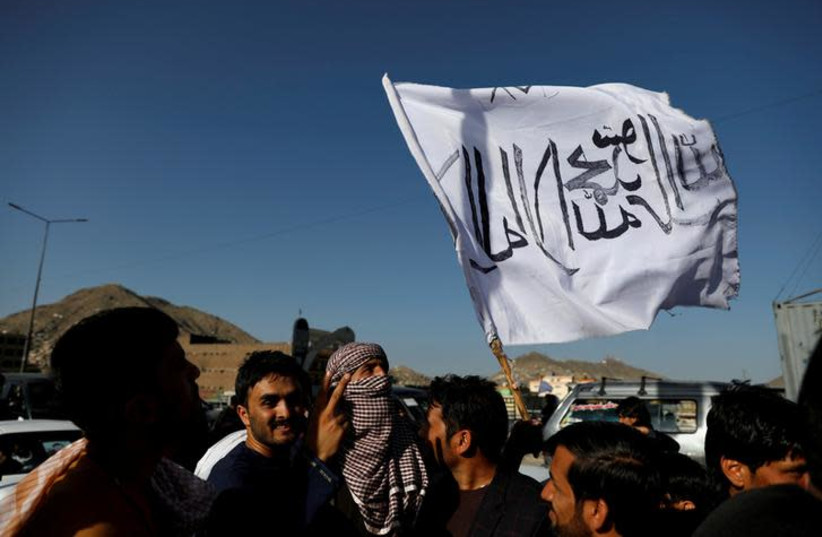While the US was planning to leave Afghanistan – agreeing to a deal with the Taliban and abandoning the Afghan government, cutting off funding and contracts and leaving military posts in the dead of night – Iran was angling for a more inclusive Afghanistan.
While the US paid lip service to diversity, with the US Embassy in Kabul tweeting a gay pride flag in June, it had in fact already decided to leave more than a year ago. But Iran must deal with the Taliban as a neighbor to the east, and Tehran is concerned that the extremism of the 1990s will return.
This is a complex problem for Iran, which has traditionally sought to protect and cultivate Shi’ites around the Middle East, sometimes to empower them and other times to export its “revolution.”
But the Islamic Republic also has far-right religious friends from other groups, such as Hamas. This is because the Iranian IRGC worldview isn’t just about Shi’ites; it’s also about working with anti-Western, anti-Israel and other elements across the region.

When it comes to Afghanistan, its policy is also complex. Iran had deep tensions with the Taliban and al-Qaeda in the 1990s, when the Taliban was viciously suppressing Hazara Shi’ites in Afghanistan and hosting al-Qaeda elements that sought to target Iran.
The sectarianism bubbling to the surface in those days pitted Sunni jihadists against minority Shi’ites, whom they viewed as subhuman infidels at the far end of the jihadist spectrum, similar to the Nazis’ view of Jews. ISIS, for instance, committed genocide against Shi’ites, Yazidis and others.
Iran’s tensions with the Taliban shifted when America invaded Afghanistan after 9/11. Tehran is cynical and pragmatic, and much as it once was happy to accept Saddam Hussein’s air force fleeing from Iraq, it welcomed al-Qaeda elements and hosted them.
Now, Iran is watching as the Taliban comes to power, and Tehran has met with its leaders. Where Iran agrees with the Taliban is the need to get the US out of Afghanistan. But where it disagrees is in how the Taliban may treat minorities.
Iran’s Tasnim News Agency confirms this by highlighting the “ethnic-religious diversity” of Afghanistan. It wants to see the Taliban “implement its way of governing according to the will of the people.”
One could be forgiven for mistaking the Iranian pro-IRGC media statements for something that comes out of Washington. “Will of the people” and “diversity” are usually the hallmarks of US policy and governance.
Iran’s logic is not that this “will of the people” needs to be a democracy, but, rather, that “a new era of political, social and security developments in Iran’s eastern neighbor began,” Tasnim wrote. It is saying that the Taliban may form an “inclusive political system.”
But Tehran cautions: “The face of the Taliban is associated with violence and extremism in the eyes of most of the people of this country as well as world public opinion, and the history of this group’s rule over Afghanistan is not desirable in the public mind.”
Iran acknowledges that the Taliban has a new public relations campaign trying to change its image.
“Although the Taliban continue to insist on the formation of an ‘Islamic Emirate,’ during this time they have repeatedly stressed the need for interaction, dialogue and tolerance with internal and external parties, and are trying to increase their ‘soft power,’” Tasnim wrote.
Iran, which proclaims itself an Islamic Republic, is concerned about an Islamic Emirate? Iran wants groups in Afghanistan that are linked to Iran, such as Shi’ites it has recruited to fight in Syria, to still have connections with Tehran. It wants to see power divided between groups.
“Such remarks by Taliban officials have sometimes been practical in recent weeks, as they have acted peacefully in dealing with government elements and even former government officials,” Tasnim wrote.
But Iranian media caution that it is too early to make a final judgment on the Taliban’s definitive policy of forming an inclusive government.
“If it wants to be accepted by its people and the world public opinion, it has no choice but to show in practice that the image of the Taliban’s five-year rule (1996-2001) should be forgotten,” Tasnim wrote.
Iran, which appeared to welcome the Taliban victory, now awaits a future test of the Taliban’s discourse to see if it has changed its ways.
